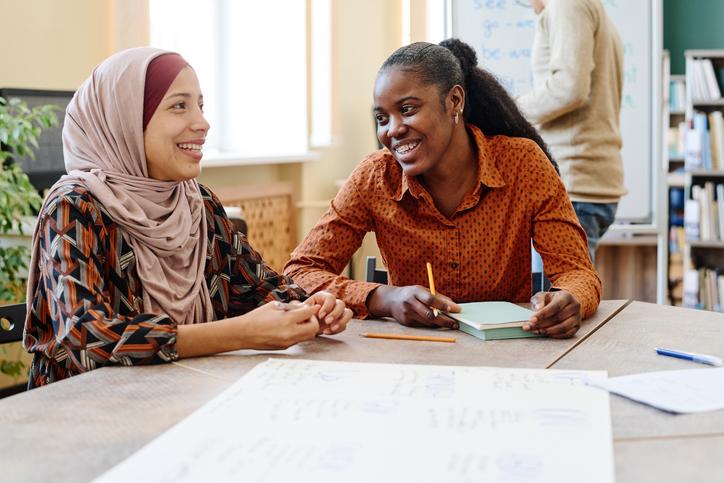Business schools have traditionally focused on profit generation, but in an era of social and environmental challenges, should they be doing more? As universities strive to meet the UN’s Sustainable Development Goals, business schools can go beyond traditional classroom learning to foster social impact. One way to do this is to work with their local communities, external partners and engage in student-centred knowledge exchange initiatives to not only educate but empower both students and community participants.
- The formula for a successful knowledge exchange programme
- A model of authentic knowledge exchange to advance social inclusion
- The fundamentals of successful student knowledge exchange
We recently put this idea into practice through a collaborative project with a local registered charity supporting disadvantaged women. The pilot project, coordinated and managed by a team of academics, began with understanding what skills could benefit those being supported by the charity and exploring how business school students could help fill these knowledge gaps, while also learning about their backgrounds and the challenges they face.
The students, who were primarily studying accounting, were then able to offer essential finance lessons, such as how to use Excel and QuickBooks, to boost participants’ employability skills and support them as they plan their next steps.
The collaboration between business school students and charity participants highlights the importance of intergenerational learning and cultural representation. Despite the charity participants being significantly older, with an average age of 36 compared with the students’ 19, the age gap did not hinder the exchange of knowledge.
Notably, 90 per cent of both groups were from BAME backgrounds, fostering shared understanding, while the 60-per-cent-female student cohort may have influenced support in areas such as female entrepreneurship and confidence-building. These insights show how the programme benefits both students and participants by enhancing cultural awareness, leadership and social responsibility.
Key stages of the project
- Identify a charity and its needs
- Select participants from the charity
- Advertise the project to students and select student collaborators
- Provide Excel and QuickBooks (accounting software) training to students
- Deliver the knowledge exchange between students and the charity participants
- Publish a research paper based on the project to offer a learning resource for others
The experience was a two-way learning exchange, as by working together participants and students learned from one another and came out of the process with a new set of skills and a refreshed mindset.
Lessons learned from collaborating with a charity
1. Charity participants acquired skills that enabled them to explore entrepreneurial ventures.
Tip: Invite student entrepreneurs to consolidate the knowledge exchange.
2. Students gained soft skills by engaging with the wider community and learning outside the classroom. They developed empathy, cultural competence and a deeper understanding of the challenges faced by marginalised communities.
Tip: The project team can attend the introductory meetings between students and participants and can act as facilitators.
3. Students received valuable insights into community engagement and social responsibility, learning how business schools can positively impact marginalised groups.
4. Students honed project management skills, including planning, coordination and implementation, while enhancing their leadership and teamwork abilities.
Tip: Let students take ownership of scheduling and content of the knowledge exchange sessions.
5. Students applied their theoretical knowledge in practical settings, improving their communication skills by teaching complex topics to diverse levels of competency.
Tip: Use Excel and QuickBooks case studies to create appropriate materials for the participants.
6. Charity participants gained a vital understanding of the obstacles faced by small businesses to prepare them for their future endeavours.
Tip: Host a business skills workshop that covers the legal and tax implications for new businesses.
7. The project encouraged reflection on ethical business practices and personal development, ultimately broadening perspectives on how businesses can contribute to social good.
8. The experience instilled responsible and sustainable practices in students and charity participants.
Tip: Give students more opportunities to engage in real-world experiences.
This initiative aligns with the principles for responsible management education, an approach that encourages business schools to embed sustainability, ethics and inclusivity into their teaching and research. By designing projects that bring students and community members together, we saw first-hand how business education can contribute to SDG 4 (quality education) and SDG 17 (partnerships for the goals).
Crucially, the project was not a one-off experience. It demonstrated that universities can and do play an active role in creating lasting social impact through sustained partnerships with local organisations. This isn’t just about corporate social responsibility – it is about reimagining the role of business schools in society.
If business schools are to remain relevant in an increasingly socially conscious world, they must evolve beyond traditional teaching methods. Engaging students in hands-on, community-based projects does more than enhance employability; it equips them with a sense of purpose and a broader understanding of the role business can play in driving positive change.
Sheeja Sivaprasad is principal lecturer in finance; Sudha Mathew is EDI lead for the School of Accounting and Taxation; Sobia Razzaq is senior lecturer in law; and Kumari Juddoo is senior lecturer in accounting and taxation, all at Westminster Business School at the University of Westminster.
If you would like advice and insight from academics and university staff delivered direct to your inbox each week, sign up for the Campus newsletter.




comment